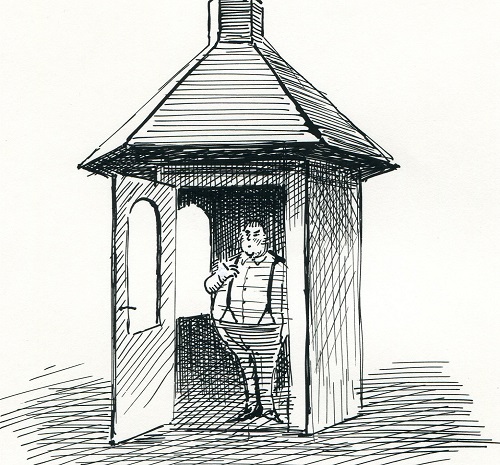
The smoking cabin… who doesn’t recognize it? Where has the time gone when we had to hang our clothes out to air after we came home from the chess club? And another question is, of course: who recognizes this player with his braces…?
In Het Parool of 30 January 1961, Amsterdam first got acquainted with Robbie Hartoch: ‘When I was six I started playing chess – at ten I quit. I drowned in it, and it became too much for me. I didn’t touch a chess piece for two years.’ At twelve he tentatively re-started, and then things developed fast.
In 1962, Hartoch was allowed to participate in the IBM tournament – he had just turned sixteen. Jan Timman had to wait longer for his first chance, but then he was from Delft and not from Amsterdam… or maybe somewhat older youth players like Hans Ree had paved the way for Robbie? He claimed he liked fishing just as much as he liked chess, and maybe that was just as well, since he started with zero points out of three games. However, he recovered well, and lost only one more game after that: against Heidenfeld, Hartoch lost on time on the fortieth move in a drawn position…
In 1964, he won – shared with Jørn Sloth, the later World Correspondence Chess Champion, and ahead of Robert Hübner – the Niemeijer tournament, which was later redubbed the European Youth Championship. In the clock simultaneous after the event he beat Mikhail Botwinnik – a nice visiting card! After this he won the Dutch junior championship in 1965, earning a ticket for the World Junior Championship in Barcelona.
In those days, the World Junior Championship consisted of a qualification group followed by a final group, instead of one big Swiss tournament. And, of course, no age categories yet… The qualification group was not a problem at all for Hartoch, who qualified as easily as pie with a 4½ out of 5 score. The only remarkable thing here was a draw in eight moves with Arne Zwaig.
The final group was a completely different kettle of fish: a ten-player event with Bojan Kurajica, Robert Hübner, Vladimir Tukmakov and Istvan Farago, to name but a few. After a quiet start with three draws, Hartoch won his first game. A few more draws and one win followed, until he beat Kurajica in the final round – but by then the latter was already beyond reach with 6½ points. But it did result in an excellent second place (‘with the Russian Tikmatow’, as the Algemeen Handelsblad reported) with six points.
And then Hartoch quickly obtained the master title, you would think. But that didn’t happen. Winning tournaments turned out to be difficult; second places were a lot less difficult. Only in 1971 did he earn the master title, with, among others, a beautiful victory over Paul Keres at the IBM tournament. He was strong enough for the Dutch Olympiad team: he took part in both Siegen (1970) and Skopje (1972), but as a reserve player. In Siegen, by the way, he replaced Timman…
At both Olympiads, Hartoch obtained a clearly positive score, and in Skopje he even started with three out of three. After that – a number of quiet draws, until the Dutch team had an off-day in the tenth round. ‘Ever heard of Hase – a chess player with that name?’ sighed the reporter in Schaakbulletin. ‘Or a player like Debarnot?’ Alas, these two gentlemen had beaten our young heroes Hartoch and Timman…
In 1972, Hartoch did reach his highest Elo rating ever: 2531, No. 181 in the world rankings!
In 1975 Hartoch had his best performance in a Dutch Championship (beste prestatie bij een NK): with fresh play he ended shared third behind Timman and Böhm, who were in a class of their own in that year. At this event, there was the only incident involving Hartoch that I know of: in his game with Roy Dieks he swept all the pieces from the board after his opponent had been crossing all limits of decent behaviour for a long time.
His chess understanding remained, but his will to win slowly melted away. Hoogovens, IBM and the Dutch Championship remained a fixed pattern in Hartoch’s chess year until the 1980s, but there were no more highlights. Afterwards, there were a lot of open tournaments, but in such events draws are lethal for your chances to win prizes. He had a lot of side activities: writing on chess in Het Parool (closing the circle), blitz against the Bear (where he would take on all comers with only one minute thinking time – bullet chess ahead of its time) and he was a soccer referee for many years! I myself played Rob twice – coincidentally in the same year, 1995: first in the Dutch League, and later during the championship of Amsterdam. Both games were drawn, of course… (PvV)